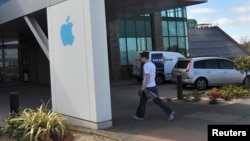The European Union has launched an investigation into the tax deals that three countries made with international corporate giants Apple, Starbucks and Fiat to see if they gave the companies an unfair financial advantage at the expense of ordinary taxpayers.
EU's antitrust chief, Joaquin Almunia, said Wednesday regulators are targeting tax policies affecting two U.S.-based companies, technology firm Apple in Ireland and the Starbucks coffee chain in the Netherlands, along with the finance arm of Italian automaker Fiat in Luxembourg.
National governments often use favorable tax policies to attract new businesses to their countries. Almunia said it is unacceptable that large multinational companies do not pay their "fair share" of taxes.
"Selective tax advantages to the benefit of multinationals distort competition seriously in our single market," he said. "Moreover, when public budgets are tight and citizens are asked to make efforts to deal with the consequences of the crisis, it can't be accepted that large multinationals do not pay their fair share in taxes.''
Almunia said the investigation would focus on whether the three countries gave the corporations illegal state aid. He said nine other countries are under preliminary investigation for their tax deals.
The focus of the investigation centers on financial transactions called transfer-pricing, under which companies redistribute profits between subsidiaries, typically located in different countries, in order to minimize their taxes. If the companies illegally benefited from the rulings in the three countries, they could be forced to pay back the tax benefit.
EU's antitrust chief, Joaquin Almunia, said Wednesday regulators are targeting tax policies affecting two U.S.-based companies, technology firm Apple in Ireland and the Starbucks coffee chain in the Netherlands, along with the finance arm of Italian automaker Fiat in Luxembourg.
National governments often use favorable tax policies to attract new businesses to their countries. Almunia said it is unacceptable that large multinational companies do not pay their "fair share" of taxes.
"Selective tax advantages to the benefit of multinationals distort competition seriously in our single market," he said. "Moreover, when public budgets are tight and citizens are asked to make efforts to deal with the consequences of the crisis, it can't be accepted that large multinationals do not pay their fair share in taxes.''
Almunia said the investigation would focus on whether the three countries gave the corporations illegal state aid. He said nine other countries are under preliminary investigation for their tax deals.
The focus of the investigation centers on financial transactions called transfer-pricing, under which companies redistribute profits between subsidiaries, typically located in different countries, in order to minimize their taxes. If the companies illegally benefited from the rulings in the three countries, they could be forced to pay back the tax benefit.





